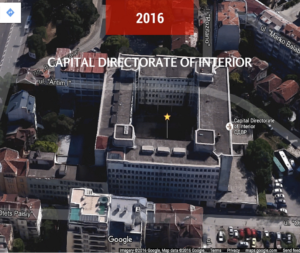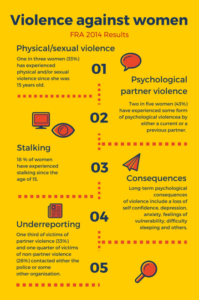Currently, one in five women in the European Union have experienced stalking since the age of 15 – our author has been a victim herself. Nevertheless, not all EU countries have a clear definition of stalking. But what are the effects of cyberstalking on the victim? What are the current investigation practices and tendencies in Bulgaria? And what needs to be done to tackle the issue?
My heart was pounding as I left my apartment and headed in the direction of the police precinct. Already late, a hundred questions were running through my head. What were they going to ask me? What was the expected procedure? Did they have information about him? Was he in the same city? I felt extremely anxious but could not help wondering how other women might feel confronting the police about far worse and more threatening situations. Did they have the support of their friends, or lawyers who were knowledgeable of the issue? Would they have turned around, knowing that in just a few minutes they would have to share an experience that they did not want to relive?
I was on my way to give information and be questioned about a cyberstalking case. In late 2015, I had begun to receive private messages via my Facebook profile from a man I had met one year earlier. A student at the time, he had come to the office where I work, a human rights organization, to interview me on video about an event I was organizing. Following the meeting, I did not hear from him for a year when I began to receive disturbing messages, including violent sexual and physical threats, threats of kidnapping and female genital mutilation, marriage proposals, accompanied by numerous pictures of bloody wedding dresses and cakes, as well as projections of how we would be united on December 30, how we would live together and have two children. I had received personal hate mail before but this was different. His messages contained suggestions that he was suffering from some form of psychosis. He often mentioned that someone was following him and made references to dark and light forces such as Lucifer and God.
Cyberstalking in Bulgaria
So what does someone do in such a situation? Some friends asked me why I did not just block him and move on. I had blocked him. But the idea that there was someone out there publicly posting information about me and imagining an unreciprocated future was unnerving. I also could not ascertain whether he was dangerous and would not act on his threats.
Ideally, I could turn to the police authorities which exist for the purpose of law enforcement and intervention when necessary. But what measures did they have at their disposal in Bulgaria for cyberstalking cases or a man potentially suffering from а mental health problem. And if there were instruments in place that could be used in such a case, what guarantees were there that a person’s civil liberties would not be violated? How would such instruments be adequately and fairly implemented in a society devoid of trust?
Currently, the legislative framework in Bulgaria does not have a clear definition of stalking, which is considered to be “a repetition of acts intruding into a person’s life, increasing in intensity over time”[1]. One such example is cyberstalking, a persistent and threatening intrusion, using online or electronic communication, such as e-mail or instant messaging, or messages posted to a website or a discussion group.
Online harassment and stalking based on gender online is quite common, with one in five women in the European Union (EU) having experienced stalking since the age of 15 (9 million), according to a recent EU Fundamental Rights Agency (FRA) report. Cyberstalking can include threats of violence such as rape as well as publicizing a victim’s personal information.
As I read up on the issue further, I found that cyberstalking often resulted in limiting a victims’ activities online or driving them offline entirely, thereby hindering their participation in online life and undermining their autonomy and dignity. Stalking also causes distress, anxiety or fear and, while it is a form of violence in itself, it can lead to other forms of violence, including murder. While I did not want to create commotion around the issue, it made me uneasy and I began to change my behavior offline: sleeping with my room door locked, often waking up at night, and avoiding the main entrance at work.
What often happens in stalking cases is that victims commonly fail to recognize the early signs of this form of violence. This can lead to underreporting, as they do not consider each act in itself as a threat. On the other hand, if they do decide to report it, authorities may not respond adequately as they fail to see that the intrusions amount to a pattern or because there is no appropriate legislative framework in place.
Meeting the police
Entering thе police precinct, an unfriendly dilapidated building from the seventies, I sat down in the waiting room and phoned the police officer charged with the case. He sounded friendly over the phone. I watched an older man attempt to close the entrance door which was coming off its hinges. As I waited, I looked at my surroundings. The information desk was covered with crumbling posters of famous police movies. I felt like I was in line to get a ticket for the theatre.
Around 15 minutes later, the police officer came down to sign me in and walk me up to his office. We took a timeworn elevator to the fifth floor and walked down a poorly painted orange corridor, swerving through an archway to go up to a mid-floor area, where his office was located. I tried to engage in small talk asking when the station had last seen any renovation? Its run down quality was unwelcoming and intimidating.
He gestured for me to take a seat at a desk next to his so the questioning could begin. He asked me if I knew the man stalking me? When had we first met? When had he first contacted me? What was the essence of his messages? Had I ever seen him on the street or in front of the office?
After about forty minutes, he took out a form and explained what I needed to fill out and what language to use. I sat down and started to write. Every once in a while a colleague of his would burst into the room and would either stare at us and leave or rudely interrupt with abrupt questions. Were other women also questioned in that same room in a similar manner? As I was writing, my eyes wandered across the room. On the mirror was a sticker of a naked woman, small but there.
Once I completed the form that recounted the string of events leading up to my being in the police station, he carefully read through the text and asked several other questions. He then informed me that I would have to undergo a psychiatric evaluation regarding whether the fear experienced was substantial and grounded. He emphasized that I would have to come down to the police station several times more. He made it seem like a hassle, a nuisance, as if it was not necessary. I asked what would happen if I did not undergo the psychiatric evaluation. Would the report be shelved? Avoiding a direct answer, he mumbled that it would not necessarily be the case, which I would later find out upon consulting with a lawyer to be exactly the case.
Meeting with the psychiatrist
I was called back to the police precinct one week later for the psychiatric assessment. I had to recount the factual events and delve into the details about how I had felt and what were the changes in my life and mental state. The psychiatrist established that as a result of not having altered significant aspects of my life, such as having changed apartments or jobs, I had not experienced well-founded fear but she did believe that the man in question was suffering from some form of psychosis and required intervention.
What followed was an unprofessional, heated discussion between the psychiatrist and police officer, who had been in the room the entire time. Having worked closely with the prosecutor’s office, the psychiatrist made a point of voicing that the police tended to terminate such cases even when there was a clear need for intervention. Oftentimes, the police are the first responders to mental health crises — even though they do not have the training for it and may not respond until it is too late.
As they conversed, I disappeared to them– they even mentioned where he was currently staying, information that I imagine is confidential. Nevertheless, I did feel relieved to know that he was not in the same city anymore. The police officer underlined that it was necessary to uncover the facts. To give an example of this he mentioned a case in which they investigated a Facebook group, whose members posted threats of burning cars and damaging other private property. They had believed members to be “serious criminals” but had consequently discovered that they were only 14-year old boys.
He was essentially incapable of differentiating between cases of totally different potential outcomes and severity, making a false comparison between teenage bravado and a potentially very ill and frightening man. And while it was currently not a grave case, it nevertheless warranted some kind of intervention, which might not even be possible due to an inadequate legislative framework or lack of services available in the community. It was apparent that there was a general sense of uncertainty as to how to respond to such “new” problems.
The discussion continued as the police officer ushered us out of his office and down the corridors. I interrupted to ask what was to follow and what I should expect as I was being escorted out of the building. I wondered what the procedure was in other cases, more serious cases.
Can the Istanbul Convention change all this?
The lack of sensitivity towards and willingness to tackle issues related to violence against women could change with the Council of Europe’s Convention for the prevention and fight against violence on women or domestic violence, also known as the Istanbul Convention. The Istanbul Convention, adopted in 2011, is the first legally binding instrument, aimed specifically at introducing mandatory minimum standards to prevent and fight violence against women and domestic violence, victim protection and sanctions against perpetrators. What is more, the Convention obliges member states to initiate measures for protection against all forms of violence based on gender.
Currently, stalking is treated as a crime against the person in many countries, including 15 European states. According to Article 34 of the Convention, parties should implement the necessary legislative change or introduce other measures to ensure that repeated behavior intended to threaten another person, causing her or him to fear for her or his safety, is criminalized.
At the end of January during a meeting at the Parliamentary Assembly at the Council of Europe, Bulgaria’s Minister of Foreign Affairs Daniel Mitov announced that Bulgaria would finally ratify the Convention by May 2016. This means that the country will be obliged to organize trainings for law-enforcement officials on how to identify and respond to stalking cases, instruct the police to investigate and keep a record of such cases and ensure the implementation of restraining orders also in stalking cases. Finally at the end of April, just weeks before the government’s vow expires, Bulgaria officially became the 40th member state to sign the Istanbul Convention. This is an incredible win, a result of a long battle on behalf of numerous non-governmental organizations working in the field of women’s rights.
With one in three women in 28 EU member states having suffered physical and/or sexual violence since the age of 15, according to a 2014 FRA report, the data is clear about what we have to do. With the passing of March 8, International Women’s day, we must take note that it is vital to cease negating and dismissing women’s experiences. The Istanbul Convention will give women the necessary instruments to defend their rights in Europe but it will also require a serious commitment, resources and a change of culture that the Bulgarian government should take a lead on. Until then, people will continue to challenge valid statistics and data on violence, preferring to turn their backs on women’s suffering.
As for my experience, as of January 2016, I have not heard from the police officer handling the case, neither have I received information about the proceedings or measures taken. In the end it may turn out to be all just paperwork without any real intervention or support for either of the sides. Now begins the campaign for ratifying the Istanbul Convention, which hopefully will not take as long as it did to sign.
[1] Council of Europe, Parliamentary Assembly.
Svetla Baeva
Svetla Baeva is the Campaigns and Communications Manager at the Bulgarian Helsinki Committee, a prominent human rights organization in Bulgaria. She is 2010 graduate in Political Science from the Vrije Universiteit Amsterdam and holds a double BA degree in European Studies and Journalism. She is also a researcher on issues such as children's right's and deinstitutionalization and refugee rights.







[…] Dark Side of the Net: Cyberstalking – which may lead to mental health problems for the […]